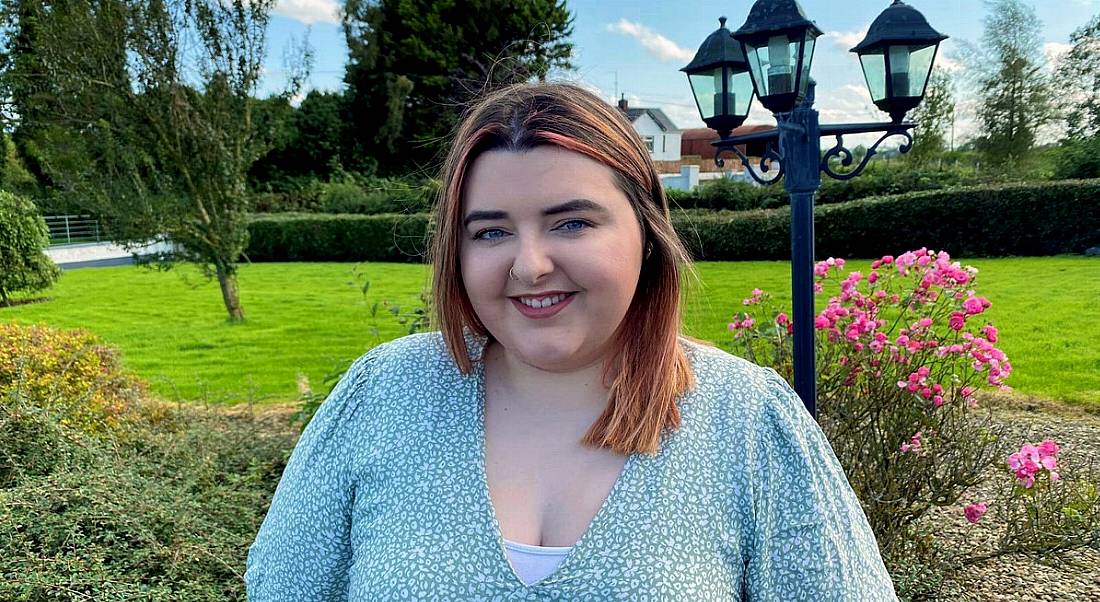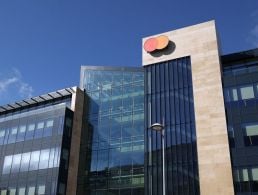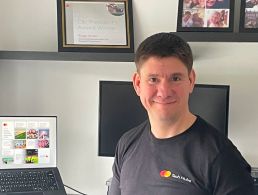Amy Rowe, a software development engineer at Mastercard, explains how she moved from intern to graduate to full-time employee at the company.
What does it take to kickstart your career in technology? For Amy Rowe, it was a combination of her college course and the opportunities afforded her by the Mastercard Launch programme.
Having studied enterprise computing at Dublin City University and worked at Mastercard as both an intern and a graduate, she is now a software development engineer at the company. Here, she reflects on what made her time on the Launch programme a success.
‘I have been encouraged to express myself at work, which I do through colouring my hair and wearing whatever clothes I feel comfortable in’
– AMY ROWE
With this time at Mastercard, are you now working in your desired industry?
My whole life, I grew up thinking I was going to go into teaching. Whenever I was asked what I wanted to do, that was the answer I gave. But I got introduced to the world of technology by researching and buying parts to build a PC with my brother. It sparked my interest in technology and made me realise this was what I wanted to do.
Mastercard was an obvious choice since it is in the centre of the tech industry and I heard great things about the culture here. Dublin is home to Mastercard’s only Europe-based technology hub and it was an opportunity I couldn’t miss to join one of the most widely recognised brands in the world.
Although I am currently working in my desired industry, Mastercard allows full-time employees to make lateral moves. This would give me the opportunity to explore other career options without leaving the company if my career goals change in the future.
What expectations did you have before you began the Mastercard Launch programme?
I knew there was going to be different expectations in terms of the Launch programme coming from the internship programme. Mastercard Launch is 18 months long and we take part in continuous learning each month to improve different skills and prepare for events in our career. For example, how to take constructive criticism from your team and how to present your ideas in a communicative way.
To kick off the programme, we travelled to New York to meet the other ‘launchers’ and to have a series of talks and workshops from executives. The workshop that stood out the most for me was the refugee-simulation exercise, where we were given a family and limited supplies and had to try to get to a safe country through whatever means possible. From this, I could see more of what would be expected of me as a Mastercard employee; working as a team to develop innovative solutions to real-world problems.
What duties and responsibilities were you given initially?
When I returned, I had a full year of work to catch up on. I caught up quickly with support from my new team, which had been created in my absence. At the start, I was given new pieces of work but I had the same responsibilities as I would have had when I was an intern. As I got back up to speed, I was gradually given more work until I was at a level where I was able to deliver as much as everyone else on my team.
I joined the intern and university engagement committees after a couple of months. One of my favourite events was a campus outreach event in the form of ‘speed interviewing’, where potential candidates could ask us questions about Mastercard, our culture and what it’s like to work here. Most people still assume we are just a credit card company and it’s interesting to try and bridge that gap to show people we are a tech company.
Did the scope of your work change as the programme progressed?
I started working on new projects as I progressed in the team and I have had the chance to work on some new technologies by myself. This has increased my problem-solving skills and allowed me to work independently on my technical skills.
I supported the interns with their transition to working from home, but I also had to figure it out myself. I hosted a session with the interns in the first couple of weeks of working from home where we tried to brainstorm some methods that could help us with the adjustment. I explained how we all had to be vocal if we had any issues or were struggling with anything, seeing as people can’t see you struggling while you’re at home.
It’s really exciting in Mastercard that you can always adjust the scope of your responsibilities and join committees or volunteer for topics you are passionate about.
Can you describe a typical day in your role?
My day always starts with a scrum meeting. We talk about what we worked on the day before and what we will be working on for the rest of the current day. This is another chance to voice any concerns or issues that we have.
As a software development engineer in test, I work on getting my tests written, passing and demoed before our sprint ends. We host test case reviews in my team frequently to ensure that the level of testing is being kept at a high standard.
There is always something happening for the interns between our sync-ups, tech talks or ‘lunch and learns’. I attend those to make sure everything goes smoothly and because I always come away having learned something new.
It seems like nothing and everything has changed since we started working remotely. You have to be even more self-driven and motivated, but it’s also important to keep a strict work-life balance, as sometimes those borders are not so visible when you’re working from home.
The thing I miss the most from the office is the social interactions and the in-person support that you receive. Looking for help from the person next to me doesn’t really work when I’m in my house in Monaghan.
How do your responsibilities compare to more experienced employees’?
I really like Mastercard as there is no visible hierarchy in the teams. Even when I was an intern, I was treated as part of the team. Everyone is given their own work, but there is a lot of support available.
My responsibilities are similar to more experienced employees, though I get more time and support to complete my tasks to ensure I am learning on the job and able to deliver while not being under too much pressure. One responsibility that more senior employees have is supporting junior developers with their tasks and although I am not at that level yet, I do help the interns where I can.
Do you feel more prepared for working life after completing this programme?
As a graduate, you are given a lot of chances to meet new people and network. We took part in a graduate mentorship programme where we were connected to a manager or director outside of our reporting line. This let us discuss professional questions objectively with someone who has experience; who could give us advice for anything outside of our team.
Not only have I enhanced my technical skills throughout my time in the company, I have also been given the opportunity to enhance my soft skills. By taking part in events such as demonstrations, panels and talks, I have become a lot more comfortable speaking in front of crowds, something I had struggled a lot with previously.
Why should someone apply to the Mastercard Launch programme?
The Mastercard Launch programme is a great introduction into the workplace. We are one of the biggest tech companies and it’s a privilege to be part of such inspiring growth.
A value that Mastercard promotes is to ‘bring your whole self to work’. I have been encouraged to express myself at work, which I do through colouring my hair and wearing whatever clothes I feel comfortable in. This makes me feel appreciated and valued in the company and makes me want to put my all into the work.




